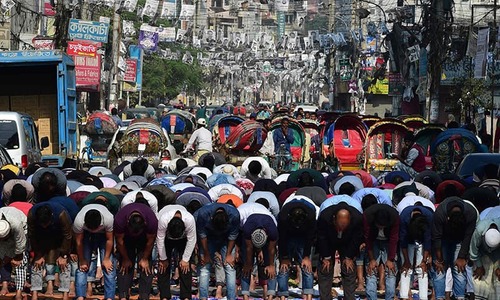DHAKA: Bangladeshi Prime Minister Sheikh Hasina considers being called authoritarian by the western media a “badge of honour”, the leader’s son told Reuters on the eve of a national election on Sunday.
Hasina, who is widely expected to win a third straight term in office, has been hailed domestically for fast economic growth in the past decade and internationally for providing refuge to Rohingya Muslims fleeing persecution in Myanmar.
But her government has been accused of suppressing dissent and jailing critics, including many supporters of the main opposition Bangladesh Nationalist Party (BNP). Many journalists say she has intimidated the media by using vaguely worded laws against them.
Hasina’s son Sajeeb Wajed, however, told Reuters there was space for dissent in the Muslim-majority country of 165 million people, and that the Western media was unfair in its portrayal of his mother.
“You know what my mother told me this morning? ‘Branded authoritarian by the Western media now is a badge of honour’,” Wajed, who lives in Washington DC and runs an IT business in the United States, said in the prime minister’s official residence in Dhaka.
“Don’t you see anti-government posts on Facebook? Do you not see that? You are free to write whatever you want but you are not free to hurt someone. If you write something false and that causes an attack on someone, should there be no consequences?” He said the ruling party would reconsider a tough new media law it introduced and another it has tightened if it retains power.

Opposition, industries
The BNP, which is fighting this election as part of an alliance after boycotting the last one in 2014, says more than 8,200 leaders and activists of the alliance have been arrested since the election schedule was announced early last month. It added four workers had been killed and more than 12,300 injured in various assaults in that period.
The Awami League has denied any role in the violence.
Wajed dismissed accusations that the ruling party had “manipulated” police and the judiciary to get BNP chief and former prime minister Khaleda Zia jailed in February on corruption charges to weaken the opposition before the election.
“If courts and police are manipulated why did it take a decade to convict Khaleda Zia and her son? Why did it take us so long?” said Wajed, who speaks with an American accent.
He said if the Awami League formed another government, it would look at raising the minimum wage for workers in the garments industry, which generates sales of more than $30 billion a year and is the biggest after China’s. It only recently raised the level for the first time in five years, though workers have asked for more.
But he said the ultimate goal was to divert some of the garment workers to mobile phone and electronics manufacturing.
“Our goal is to move up the value chain,” he said. “We don’t want to stay stuck on the garments sector.”

600,000 security forces deployed
Bangladesh authorities have deployed around 600,000 police, army and other security forces ahead of Sunday’s vote, a senior official said, following a deadly campaign of clashes and the arrests of opposition activists.
The forces — which also include the elite Rapid Action Battalion (RAB), navy, border and coast guards and auxiliary police units — will guard some 40,000 election booths across the poor South Asian nation.
“We have ensured the highest level of security in Bangladesh as per the capacity of the country,” Rafiqul Islam of the election commission told AFP. “We hope there will be a peaceful atmosphere,” he said.
Bangladesh’s telecoms regulator also ordered the country’s mobile operators to shut down 3G and 4G services until midnight on Sunday “to prevent the spread of rumours”, that could trigger unrest, a spokesman said.
Published in Dawn, December 30th, 2018














































